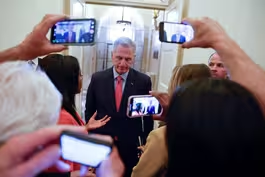
Biden picks Gen. Charles Brown Jr. as Joint Chiefs chairman
Clip: 5/25/2023 | 8m 22sVideo has Closed Captions
Biden picks Gen. Charles Q. Brown Jr. as next chairman of the Joint Chiefs of Staff
President Biden named Air Force Chief of Staff Gen. Charles Q. Brown as the nominee to serve as the new chairman of the Joint Chiefs of Staff. If confirmed, he would replace Gen. Mark Milley as the nation’s highest-ranking military officer. As Stephanie Sy reports, the pick is both strategic and symbolic.
Problems playing video? | Closed Captioning Feedback
Problems playing video? | Closed Captioning Feedback
Major corporate funding for the PBS News Hour is provided by BDO, BNSF, Consumer Cellular, American Cruise Lines, and Raymond James. Funding for the PBS NewsHour Weekend is provided by...

Biden picks Gen. Charles Brown Jr. as Joint Chiefs chairman
Clip: 5/25/2023 | 8m 22sVideo has Closed Captions
President Biden named Air Force Chief of Staff Gen. Charles Q. Brown as the nominee to serve as the new chairman of the Joint Chiefs of Staff. If confirmed, he would replace Gen. Mark Milley as the nation’s highest-ranking military officer. As Stephanie Sy reports, the pick is both strategic and symbolic.
Problems playing video? | Closed Captioning Feedback
How to Watch PBS News Hour
PBS News Hour is available to stream on pbs.org and the free PBS App, available on iPhone, Apple TV, Android TV, Android smartphones, Amazon Fire TV, Amazon Fire Tablet, Roku, Samsung Smart TV, and Vizio.
Providing Support for PBS.org
Learn Moreabout PBS online sponsorshipGEOFF BENNETT: A decorated Air Force general could soon be the next highest-ranking military officer in the U.S. As Stephanie Sy reports, the president's pick to replace General Mark Milley as the chairman of the Joint Chiefs of Staff is both strategic and symbolic.
STEPHANIE SY: At the White House today, President Biden announced General Gen. Charles Q.
Brown Jr., known as C.Q., to lead the Joint Chiefs of Staff.
JOE BIDEN, President of the United States: General Brown has become known for a signature approach, accelerate, change or lose, accelerate, change or lose.
General, you're right on.
STEPHANIE SY: If confirmed, Brown would become the president's senior military adviser.
GEN. CHARLES Q.
BROWN JR., Air Force Chief of Staff: When I'm flying, I put my helmet on, my visor down, my mask up.
You don't know who I am.
STEPHANIE SY: Commissioned in 1984, Brown piloted F-16 fighter jets, a persona played up in this Air Force recruiting ad.
GEN. CHARLES Q.
BROWN JR.: You just know I'm an American airman kicking your butt.
JOE BIDEN: And while General Brown is a proud, butt-kicking American airman, first and always, he's also been an operational leader of the joint force.
STEPHANIE SY: Brown rose through the ranks to become an instructor and commander of the U.S. Air Force Weapons School.
He served as commander of the Pacific Air Forces and commander of Air Force assets in the Middle East.
Three years ago, the four-star general was confirmed as the Air Force chief of staff.
He's credited other Black men who paved the road before him, including the late Colin Powell, the first Black Joint Chiefs of Staff.
If confirmed, the two top positions at the Pentagon would both be held by African American leaders, a first.
Not by coincidence, President Biden made the announcement on the three-year anniversary of the murder of George Floyd, a moment that caused so many Black men to reflect on their own experiences.
GEN. CHARLES Q.
BROWN JR.: Here's what I'm thinking about.
STEPHANIE SY: At the time, General Brown weighed in with a deeply personal video.
GEN. CHARLES Q.
BROWN JR.: I'm thinking about the pressure I felt that to perform error-free, especially for supervisors I perceived had expected less from me as an African American.
I think about wearing the same flight suit with the same wings on my chest as my peers, and then being questioned by another military member, "Are you a pilot?"
STEPHANIE SY: It was a rare moment of candor in a buttoned-up military culture that has not been immune to the political divide.
For more on the General C.Q.
Brown's nomination, we turn to someone who knows him well.
Retired General Vincent Brooks' last assignment was as commander of U.S. forces in North Korea.
And he joins us now.
General, it's great to have you on the "NewsHour."
So you have worked with General Brown for years, from what I understand.
What's he like as a person?
What is he like as a commander?
BRIG.
GEN. VINCENT BROOKS (RET.
), U.S. Army: Well, Stephanie, it's first great to be with you.
And congratulations to General Brown on his nomination and to secretary of defense and the president for making a great choice.
General Brown is just a great individual.
He's a true professional.
He's liked and admired by his colleagues, his peers, and followed very well by his subordinates.
He's extremely experienced in different regions of the world, in combat action and in senior leadership in lots of places.
And he's been in the joint force for a long time.
So he's superbly qualified for this, a great guy.
STEPHANIE SY: How does having been in command in both the Pacific and the Middle East distinguish him from other top brass?
BRIG.
GEN. VINCENT BROOKS: Well, not everyone gets that kind of experience.
If you're fortunate, you might get a chance to command in one region of the world.
General Brown has had the privilege of being able to command in multiple regions of the world.
He's stood face to face against North Korea.
As a more junior commander, he's led at senior levels in the Middle East against the Islamic State, standing off against Iran with deterrence, conducting operations throughout the Middle East in Iraq and Afghanistan, and, of course, as you have mentioned, in the entire Indo-Pacific region, where he gained tremendous experience in relating to all of the air forces throughout each of those regions.
STEPHANIE SY: And I imagine, in those roles, he would have also played an important role communicating with our allies' militaries.
This seems particularly important as far as countering China's military.
Is that right?
BRIG.
GEN. VINCENT BROOKS: That's certainly right.
The United States is a global leader.
It's globally engaged, and countries around the world turn to the United States for examples of professionalism, as well as skill in the military art.
And so his engagements with other air forces around the world and other senior defense leaders, not just air forces, will be very important to this role as the chairman of the Joint Chiefs of Staff.
STEPHANIE SY: When it comes to internal problems in the U.S. military, and there are many, including the reports of sexual assault - - in the Air Force, in particular, reporting of sexual assault rose significantly last year, when he was Air Force chief.
Is he doing enough to address this persistent problem?
BRIG.
GEN. VINCENT BROOKS: Well, it is a persistent problem.
And it requires constant attention to it and work to try to drive that behavior away.
Teammates don't do that to one another.
And I know that he takes it very seriously and will continue to do so as the chairman of the Joint Chiefs.
But no one person can change that.
They can certainly create the tone from the top.
And I'm confident that he's done that and will continue to do that.
STEPHANIE SY: How would you contrast General Brown with General Milley, who, during the end of President Trump's term, really became a lightning rod for partisan politics?
How is General Brown different?
BRIG.
GEN. VINCENT BROOKS: Well, both of them are members of the Joint Chiefs of Staff, so they work closely with each other on a day-to-day basis.
But contrast is sometimes what Hollywood shows, generals are not all cut from the same cloth.
So every general is a different individual, every admiral as well, and they bring their personality.
They bring their experiences to bear.
I'd say General Milley is known to be a bit more expressive than General Brown is known to be.
But both of them provide superb, professional military advice to the secretary of defense, to the National Security Council, the Homeland Security Council, and to the president as required, being the senior military person to do so in each role.
And I'm confident that that part will be consistent when they bring their personalities to bear in different ways.
STEPHANIE SY: Do you think, if he becomes chairman of the Joint Chiefs of Staff, he continues to represent the Black experience vocally in the way that we saw him doing that poignant video after the death of George Floyd?
Does he continue to address systemic racism in the military?
BRIG.
GEN. VINCENT BROOKS: He can do so from a very important position, again, setting the tone from the top, as he and the other Joint Chiefs talk about what's important and as they inform the service secretaries and the secretary defense, as they communicate with and to Congress.
This is an a very -- a very important role to certainly be representative.
And he is clearly a distinguished representative for African Americans.
But he's more than that.
And he will bring all of these characteristics to bear as he helps to try to change the culture in the military and, to an extent, impact the culture of society as well in a favorable and positive way that fulfills his view and so many of our views of what is the ideal for the United States, where we do have inclusion, we have cooperation, we have support, we have advocacy, and we're not walking past one another and ignoring talent that exists in our population and in our ranks.
STEPHANIE SY: General Vincent Brooks, thank you so much for joining us with your perspective.
And I do want to clarify for our viewers that General Brooks was the commander of U.S.
Forces in Korea, obviously not North Korea, as I misstated earlier.
Sir, thank you.
BRIG.
GEN. VINCENT BROOKS: Thanks, Stephanie.
Take care.
Brief But Spectacular take on making the ordinary beautiful
Video has Closed Captions
Clip: 5/25/2023 | 2m 38s | Michelle Zauner's Brief But Spectacular take on making the ordinary beautiful (2m 38s)
Debt ceiling negotiations see progress, but still no deal
Video has Closed Captions
Clip: 5/25/2023 | 6m 50s | Debt ceiling negotiations see progress, but deal to avoid default remains elusive (6m 50s)
DeSantis event highlights Musk's transformation of Twitter
Video has Closed Captions
Clip: 5/25/2023 | 6m 29s | DeSantis presidential announcement highlights Elon Musk's transformation of Twitter (6m 29s)
Inside encampments where migrants await chance to enter U.S.
Video has Closed Captions
Clip: 5/25/2023 | 5m 24s | Inside the border encampments where migrants await their chance to enter U.S. (5m 24s)
Investigation reveals culture of abuse inside N.Y. prisons
Video has Closed Captions
Clip: 5/25/2023 | 5m 56s | Investigation reveals culture of abuse inside New York state prisons (5m 56s)
New Minneapolis police chief on changing the department
Video has Closed Captions
Clip: 5/25/2023 | 7m 53s | New Minneapolis police chief on changing the department after George Floyd's murder (7m 53s)
Supreme Court decision scales back scope of Clean Water Act
Video has Closed Captions
Clip: 5/25/2023 | 5m 22s | Supreme Court decision weakens EPA authority, scales back scope of Clean Water Act (5m 22s)
Providing Support for PBS.org
Learn Moreabout PBS online sponsorshipSupport for PBS provided by:
Major corporate funding for the PBS News Hour is provided by BDO, BNSF, Consumer Cellular, American Cruise Lines, and Raymond James. Funding for the PBS NewsHour Weekend is provided by...


















